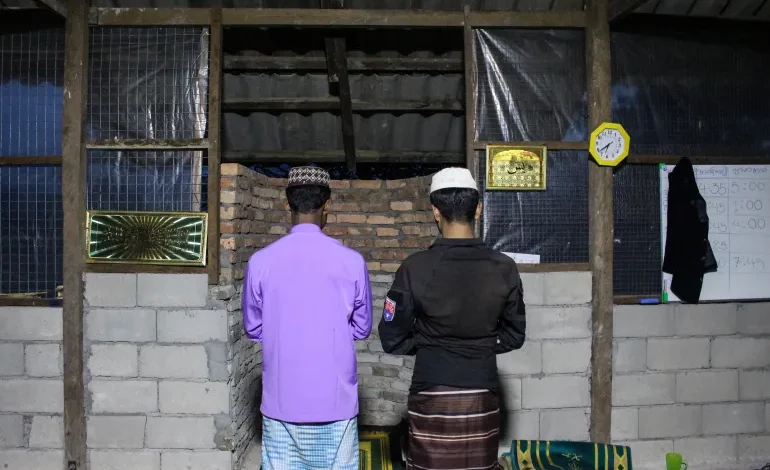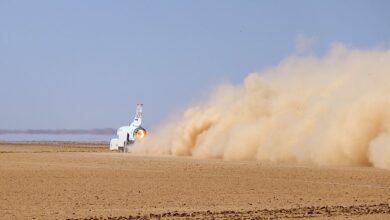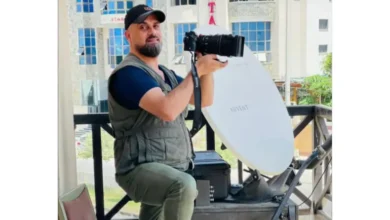Muslims join Buddhist, Christian fighters to topple Myanmar’s military

Scattered across the lush, rolling hills of southern Myanmar’s Tanintharyi region, rebel fighters stationed at checkpoints inspect cars and trucks traveling towards a nearby town still under the control of the Myanmar military – their adversary.
While this is a familiar sight in the region, where the struggle against the military waged by disparate armed groups has intensified since the 2021 coup, what sets these rebels apart is their faith.
These are members of the little-known “Muslim Company”, who have joined the struggle for democracy in Myanmar as part of a Christian- and Buddhist-dominated armed group – the Karen National Union (KNU).
Officially named 3rd Company of Brigade 4 in the KNU, the 130 soldiers of the Muslim Company are just a fraction of the tens of thousands fighting to overthrow the country’s military rulers.With their story largely untold, Al Jazeera visited the company’s headquarters, nestled between the ridges of jungle-clad mountains at an undisclosed location in Myanmar’s south, to piece together an almost forgotten thread in the intricate tapestry of Myanmar’s conflict.
“Some areas are focused on ethnicities having their own states,” Muslim Company leader Mohammed Eisher, 47, explained, referring to the armed resistance movements who have long fought against Myanmar’s military.
In Tanintharyi, Eisher said, no one group dominates the land and, besides, the military’s repression affects all groups.
“As long as the military remains in place, Muslims, and everybody else, will be oppressed,” he said.
While Eisher said he hopes the acceptance of diversity within the anti-military forces would help ease cultural and regional tensions that have previously led to conflict in Myanmar, scholars say the embrace of the Muslim Company underlines the inclusive nature of the historic uprising taking place, and the incorporation of previously marginalised groups into the struggle.
Diverse lines of descent
Myanmar’s Muslims trace diverse lines of descent.
They include the Rohingya in the west of the country, Muslims with Indian and Chinese heritage, and the Kamein, whose ancestors are believed to have been archers of a Mughal prince seeking refuge in the Arakan kingdom in the 17th century, and which is now part of Myanmar.
In Tanintharyi, where the Muslim Company is based, some Muslims are descended from Arab, Persian and Indian traders, while others are Burmese Malays, known as Pashu. The region’s ethnic diversity also includes Karen and Mon, as well as Bamar sub-ethnicities from the cities of Dawei and Myeik, among others.
In their main camp, hijab head coverings and thobes – long-sleeved ankle-length traditional robes often worn by men and women in Muslim countries – are common attire. Recitals of Quranic verses ring out from a mosque, while prayer mats are laid out at remote rebel outposts. Throughout the holy month of Ramadan, the company’s fighters observe fasting and attend daily prayers.
Successive military-led governments in Myanmar, together with hardline nationalist monks, have portrayed Muslims as a grave threat to Burmese Buddhist culture. That has resulted in Muslim communities, with roots spanning more than a millennium in Myanmar, facing scapegoating, religious suppression and denial of citizenship.
“It’s dangerous to generalize, but Muslims in Myanmar are highly vulnerable and have been exposed to significant violence,” Myanmar scholar Ashley South said.
“In Karen areas, however, one often finds communities living peacefully – and it is significant that Muslim refugees moved tentatively to KNU-controlled areas, sometimes in preference to other groups,” South said.
He added that the inclusion of groups previously alienated by Myanmar’s fractious politics is a defining trait of the current revolution, which has made strong gains against the military since it grabbed power in 2021.










